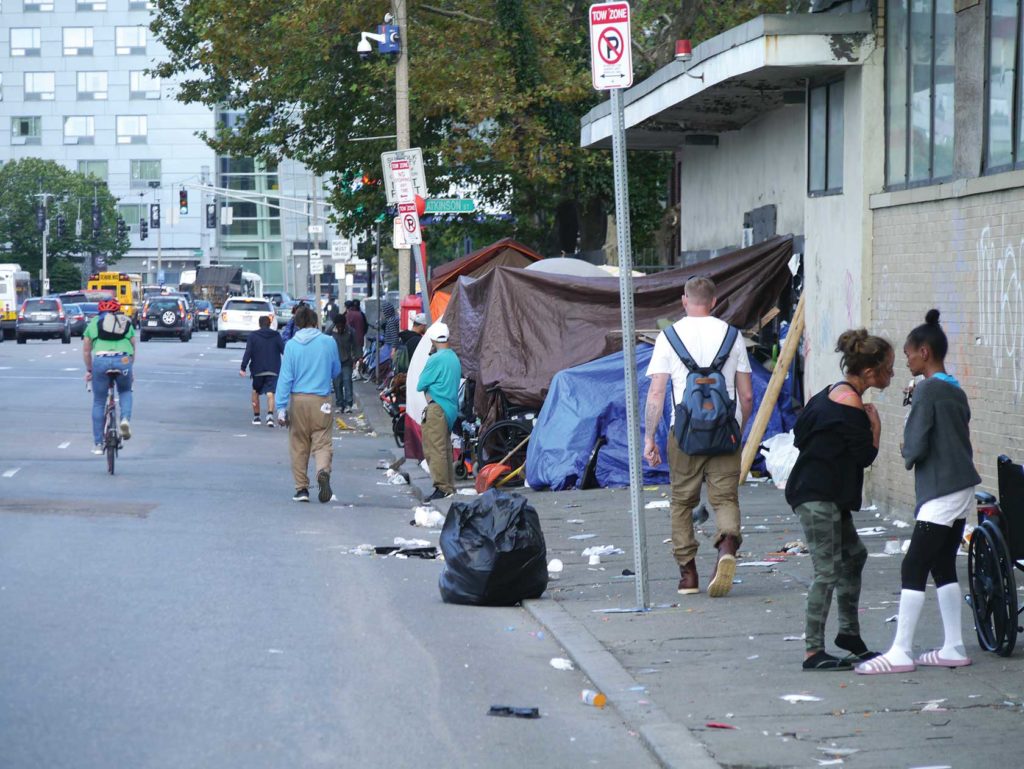Activists push candidates on Mass and Cass
Coalition demands ‘concrete plans’ for making area safe

As election season moves forward with a pared-down list of candidates, community activists are capitalizing on added attention to the ongoing opioid crisis at “Mass and Cass” by demanding that campaigns have concrete plans in order to secure neighborhood support. Started by leaders of the South End-Roxbury Community Partnership, a petition has begun circulating with the message “No plan = no vote.”
The situation at the intersection of Melnea Cass Boulevard and Massachusetts Avenue has been worsening for years — and several outlets, including the Boston Herald and WCVB have reported that over the last two weeks, the number of tents and makeshift sleeping arrangements have grown to nearly 200, up from just half that number a month ago. In addition, residents, business owners and politicians have described a state of lawlessness where in addition to open intravenous drug use, sexual acts and assaults and other forms of violence have been rampant.
Domingos DaRosa, a youth football coach, said things have become so bad that he’s been forced to combine his team with one from Brookline/Jamaica Plain — just to escape the relentless number of needles in Clifford Park. He now does pick-up and drop-off to practice daily for his players, with a van provided by activist Monica Cannon-Grant and her Violence in Boston program.
DaRosa, who grew up in the neighborhood, describes the negative impact of the crisis on youth as “tremendous.”
“When you have grown individuals injecting themselves in front of preschoolers, having sex, performing lewd acts, and there’s little to no regard to the person for the young person’s mental state — it’s beyond concerning,” he said. “We went from a community where we were able to access a lot of services within the community, where now we have to leave the community because of what’s going on on Mass and Cass.”
Yahaira Lopez, founder of the South End-Roxbury Community Partnership, echoed many of DaRosa’s descriptions, adding on the experience of her elderly mother, who she says was robbed last summer in her area home, and can’t afford to go anywhere else.
Lopez said that’s when she decided to start the group and create a social media presence showing the day-to-day in the area.
“We aim to show pictures and videos of the humanitarian crisis that is happening there, to show elected officials that we can no longer drive by and walk by like this is not real,” Lopez said.
Her posts depict overdoses, scores of needles littered across streets and human feces in public areas. She said she’s fed up with the state of things, and now is the time to demand change.
“The community has been kind, compassionate and empathetic for a long time, and we have to understand that people have breaking moments. And I think at this time, the community has had enough,” Lopez said.
In the past 10 years, tent populations as a result of the opioid crisis have fluctuated, growing significantly since the bridge to Long Island and its shelter closed in 2014. In 2021, the situation is at a point where even the food bank is threatening to leave due to security issues and issues with access being blocked by those taking up residence in the streets.
The current state of the neighborhood comes even after efforts have been made to combat the crisis — in 2019 the Walsh administration created a “Mass and Cass 2.0” task force to bring in additional outreach workers, clean-up crews and police. Those plans have, however, petered out.
City Councilor Frank Baker, who represents part of the area and was a member of the task force, said he’s frustrated with the lack of intervention and the burden the crisis has put on his constituents.
“Kindness, care and compassion. But what are we doing for the neighbors that are living through it?” he said.
Baker supports seeking out locations across the city and state for rehabilitation and detox centers and bringing in decisive police action, including strictly limiting how long an individual’s tent stays on the street, among other things.
State Rep. Jon Santiago said the first step in addressing the issue will be engaging South End, Roxbury and Newmarket residents in discussions about action plans. The second, which is a point nearly every person interviewed for this story made, is that decentralization of services is essential to dismantle Mass and Cass as an epicenter for folks struggling with addiction.
Santiago and others said having easy access to needles and other resources that make it easier to subsist in a one-mile radius make the area a magnet for those struggling, including people from outside the city.
“What goes along with the decentralization is a commitment to begin to regionalize the issue and creating partnerships with local cities and towns and with the state,” Santiago said. “And so it’s decentralization and the regionalization that we need to move forward with.”
Now, with the mayor’s office in flux, the community is demanding action from both Janey’s office and whichever candidate is elected in November.
“We can no longer continue to have this conversation about Mass and Cass by doing it in silos, because safety is impacting not just the community, [but] individuals that are unhoused that are navigating addiction,” Yahaira Lopez said.
Her “No plan = no vote” petition contains other demands such as “the creation of a 24-hour engagement center, with heightened security for the surrounding areas; a reevaluation on the positioning of the current comfort station located on Atkinson Street”; access to “any and all data collected by the Boston Police 24 Hour Outreach Team (“BPD Outreach Team”) in regard to the efforts taken to ensure people are being served; and an immediate expansion of the BPD Outreach Team to ensure the continued outreach to individuals in need.” The petition can be found on change.org. It’s called “Where is the ‘public safety plan’?”







